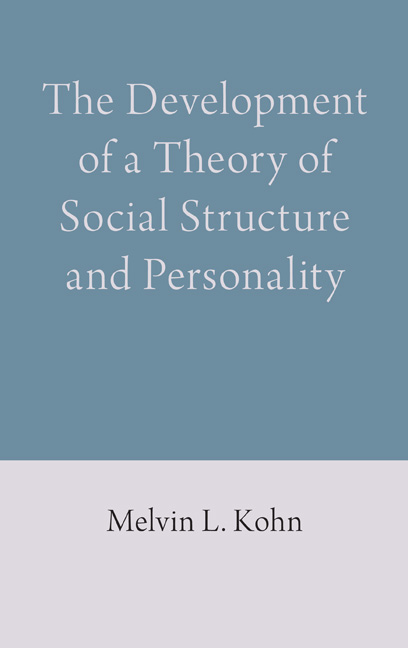Book contents
- Frontmatter
- Contents
- Preface
- 1 Hagerstown and Schizophrenia
- 2 Social Stratification and Parent–Child Relations in Washington, DC
- 3 The Torino Study
- 4 Men Employed in Civilian Occupations in the United States
- 5 The Transformation of the Occupations Study into a Longitudinal Analysis
- 6 Life on Sabbatical Leave in Norway and at the National Institute of Mental Health
- 7 Class, Stratification, and Personality
- 8 Poland under Communism
- 9 Occupational Self-Direction and Distress in Poland
- 10 The Vietnam War, Nixon, and Me
- 11 Japan
- 12 Germany – West and East
- 13 Poland and Ukraine in Transition to Capitalism and Democracy
- 14 The Presidency of the American Sociological Association, Ronald Reagan, and My Job Switch
- 15 My Two Exploratory Expeditions to China
- 16 China in Transition to a Modern Economy
- 17 Retirement, and My Last Sabbatical, at Deep Springs Junior College
- 18 The Theory I Propose
- Index
14 - The Presidency of the American Sociological Association, Ronald Reagan, and My Job Switch
Published online by Cambridge University Press: 12 July 2019
- Frontmatter
- Contents
- Preface
- 1 Hagerstown and Schizophrenia
- 2 Social Stratification and Parent–Child Relations in Washington, DC
- 3 The Torino Study
- 4 Men Employed in Civilian Occupations in the United States
- 5 The Transformation of the Occupations Study into a Longitudinal Analysis
- 6 Life on Sabbatical Leave in Norway and at the National Institute of Mental Health
- 7 Class, Stratification, and Personality
- 8 Poland under Communism
- 9 Occupational Self-Direction and Distress in Poland
- 10 The Vietnam War, Nixon, and Me
- 11 Japan
- 12 Germany – West and East
- 13 Poland and Ukraine in Transition to Capitalism and Democracy
- 14 The Presidency of the American Sociological Association, Ronald Reagan, and My Job Switch
- 15 My Two Exploratory Expeditions to China
- 16 China in Transition to a Modern Economy
- 17 Retirement, and My Last Sabbatical, at Deep Springs Junior College
- 18 The Theory I Propose
- Index
Summary
I interrupt my discussion of the research to highlight three essentials of my personal life that greatly affected my further career and my work: My presidency of the American Sociological Association (ASA), my experiences with the Ronald Reagan administration, and my concurrent move from the NIMH to Johns Hopkins University.
Presidency of the American Sociological Association
To say that I was eager to be president of the ASA would be the greatest possible understatement. A few years earlier, when I was defeated in my bid for the vice presidency, I was keenly disappointed. It turned out that this was a blessing in disguise, because it transformed me from being unknown to many members of the ASA, to becoming a viable candidate for the ASA presidency. In 1986, I was nominated for the presidency. I thought that members not very conversant with the ASA might have thought of me as a government bureaucrat and would have voted against me. I was a bit surprised when I won.
There were three components to my presidency.
The first, and by far the most important in my mind, was the presidential address. I had been a keen student of ASA presidential addresses for many years, and for the most part I had been disappointed. It seemed to me that most presidents had a mistaken notion about what the presidential address should entail. Some thought that this gave them the opportunity to demonstrate to their colleagues that they really were great social theorists. Whatever they had written before, this time they gave a theoretical address – and demonstrated that they didn't have the foggiest idea of what social theory was about. Others thought that they had been elected pope, and preached to their congregations what was wrong with sociology and what should be done. By and large, I believe that they only demonstrated that they had not understood what their colleagues had said in their speeches.
To my mind, only two of my colleagues had given really impressive presidential addresses. The first was by my ego-ideal, Robert K. Merton, in 1957, entitled “Priorities in Scientific Discovery: A Chapter in the Sociology of Science.” The second was by my mentor, Robin Murphy Williams Jr., in 1958, entitled “Continuity and Change in Sociological Study.”
- Type
- Chapter
- Information
- Publisher: Anthem PressPrint publication year: 2019



